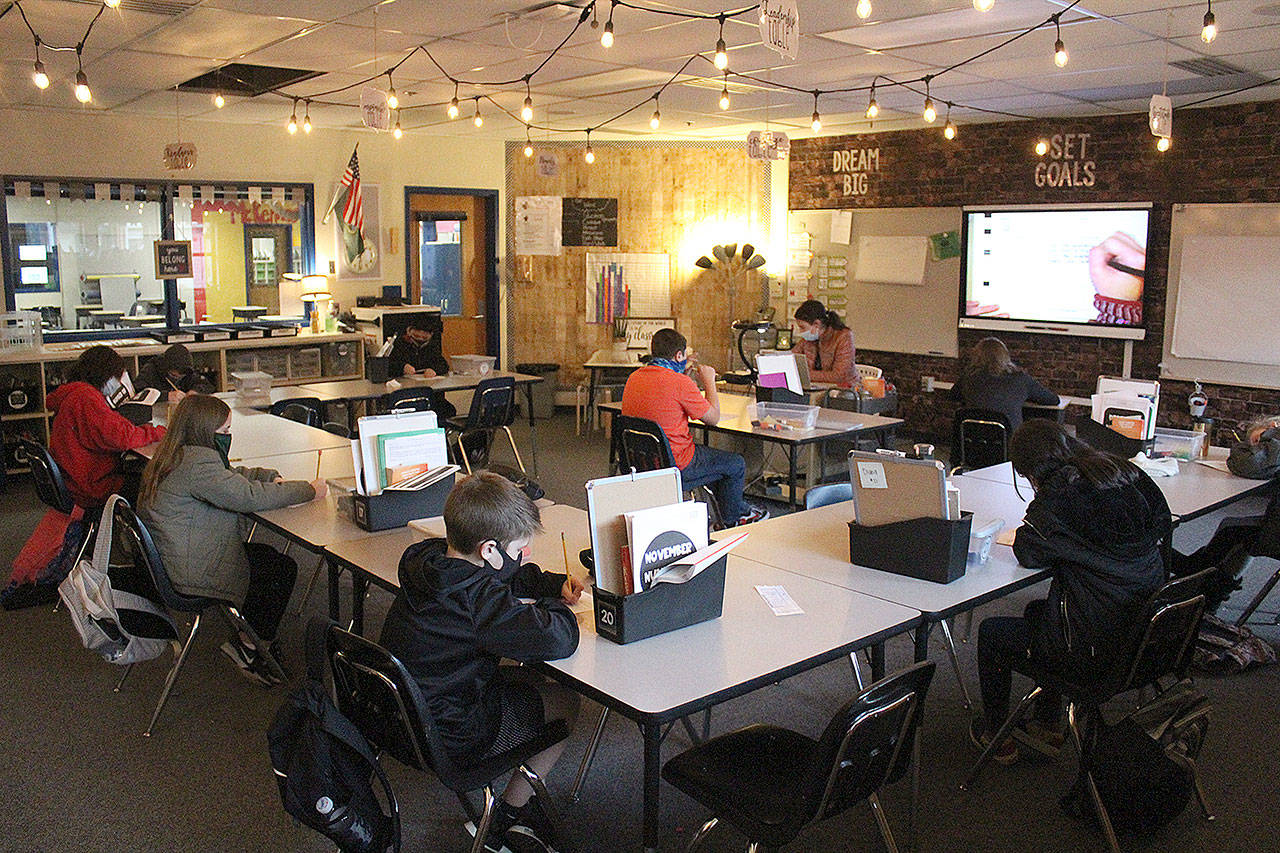White River School District students are back in the classroom.
Well, not all of them — only grades K-5 are back to in-person learning, but plans are in motion to get middle and high schoolers into classrooms in the near future.
The first day back was Tuesday, Dec. 1.
“I have been excited for this day to finally arrive, but I have to say it was even more exciting than I expected,” Superintendent Janel Keating Hambly wrote in a message to parents. “I actually heard some squeals as kids saw their teachers!”
Of course, with COVID rates rising — Pierce County has the second-most coronavirus cases in the state by county, with a total of 16,757 as of Dec. 3 — the only way WRSD was able to safely bring students back together is because the district is working with the Tacoma-Pierce County Health Department on a pilot program that tests students and teachers for the virus every week.
WRSD is one of four rural districts in the county to participate in this “Back to the Building” program.
“This pilot program model is supported by the work done by the Institute of Disease Modeling (IDM) who have produced a new report that says, combined with low community transmission and school-based countermeasures (masks, physical distancing, hygiene, daily wellness checks), routine diagnostic screening of asymptomatic people can have an impact on reducing transmission,” Keating Hambly wrote in a Nov. 16 letter to parents. “In other words, we keep doing what we are already doing, PLUS diagnostic screening for covid and we are looking at a very safe scenario.”
The screening consists of a “midturbinate nasal swab” a.k.a. swabbing inside the nostrils; according to Keating Hambly, the test is more than 97 percent accurate for positive tests, and test results are returned in minutes.
If a student tests positive, the child will be sent home. However, it’s possible for parents to request a confirmation test that takes two to three days for results, meaning the student can be back in school in under a week if the confirmation test returns negative.
“I always knock on wood, because COVID seems to have a sense of humor, but so far, we’ve had tremendous luck, and our positive rates are well, well, well below 1 percent,” said Scott Harrison, deputy superintendent, during a Dec. 3 interview. “In fact, yesterday’s tests were 0.001 percent positive across the board.”
Testing will be done by Tacoma-Pierce County Emergency Management officials in December, but it’s expected that school district staff will take over testing in January. However, because the school district hasn’t received any additional funds for this pilot program, Harrison said the county health department will need to continue providing tests — 20,000-plus every month — for WRSD to continue testing students and staff.
Besides being tested every week, the school schedule for these students have changed in order to keep classes as small and as spread out as possible.
First, school is no longer a five-day affair — instead, students are attending school Tuesday through Friday, with Mondays reserved for students that need extra instructional time.
Second, school is also no longer an all-day activity — instead, some students will attend school in the morning, and the rest in the afternoon.
“This means that class sizes are cut in half which allows for physical spacing, but also allows teachers to be very targeted with instruction because they will have only half the class at a time,” Keating Hambly wrote in a Nov. 24 letter to parents.
Of course, all these safety measures don’t mean parents have to feel comfortable sending their child back to school
According to a survey that more than 2,000 K-5 parents answered, more than 70 percent of parents chose to send their children back to school; the rest will continue full-time distance learning until further notice.
“We were predicting a response close to this, so we had teaching staff in place and prepared to continue with distance learning,” Keating Hambly wrote in a Nov. 30 letter.
MIDDLE AND HIGH SCHOOL PLANS
The current plan for middle and high school students is to bring them back into the building no earlier than Jan. 5.
“We’re certainly planning for the best and taking measures to get ready for that,” Harrison said. “The results of this pilot program and the guidance from the health department and our ability to move forward will be a major factor in that.”
One of the metrics that would allow for secondary school students to return to the classroom is showing that transmission of COVID isn’t occurring in schools.
“Frankly, there’s too many decisions that individuals make on their own, well outside of the school system, in the community each day that dictate what the transmission levels in the community will be. And any time you have community transmission, you probably will have a case or two in a school. The numbers just bear that out over time,” Harrison said. “But as long as there isn’t significant transmission in our schools, then we know we’re doing what we need to do to ensure the safety of our students and staff.”
Like their younger counterparts, school will likely look a lot different once middle and high school students are back in the classroom; Harrison said the district is still considering whether students will be split up for an A/B schedule (one group attends all day school Tuesdays and Thursdays, and another Wednesday Fridays) or whether students will attend half-day school like the elementary students.


